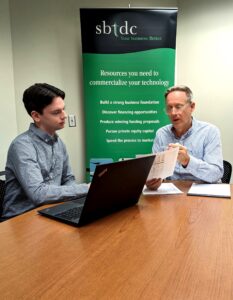News & Stories
How to succeed in business while really trying

No problem is too basic or complex for the Small Business Technology and Development Center (SBTDC) team to tackle. No idea is too out-there to consider.
They’ve heard it all from small business owners and help with all of it: How do I read a profit and loss statement? How do I know if I’m paying myself too much or if the cost of my goods is too high? How do I move to the next level? How can I compete with the big boys online?
SBTDC counselors work with small business owners who often lack access to industry information, no matter the type of business. If someone wants to manufacture buggy whips, the SBTDC researches horse and saddle sales within a certain number of miles from where a client lives. If someone is interested in opening a Hungarian restaurant, they research how many people of Hungarian descent live in a specific area and check if there’s an SBTDC employee with a restaurant background and deep knowledge of European food.
Chances are there is somebody like that working at a SBTDC.
“We are your CFO. We can be your technology team. We’re a sounding board and a board of directors,” says Joel Harper (MPA ’86, MBA ’01), who leads the Central Carolina SBTDC office in Chapel Hill. “We discover together what you should do. You decide where to take it from there.”
The North Carolina SBTDC opened 40 years ago, authorized by U.S. Congress and funded in part by the U.S. Small Business Administration (SBA) to help small businesses across the U.S. launch and grow.

Joel Harper (MPA ’86, MBA ’01), right, leads a counseling session at the Central Carolina SBTDC office in Chapel Hill.
In North Carolina the SBTDC has 11 regional centers hosted by University of North Carolina System campuses. Harper’s SBTDC branch, hosted by UNC Chapel Hill, covers six counties: Orange, Chatham, Durham, Alamance, Person and Lee.
UNC Kenan-Flagler Business School has partnered with the SBTDC since its beginning. If a client wants to better understand digital marketing, along with one-on-one confidential counseling, Harper’s team reaches out to a UNC Kenan-Flagler professor for guidance or to see if there’s a student who wants to work directly with a client, using what they’ve learned in classes to help them.
In 2023, North Carolina SBTDC centers worked with 7,046 clients, provided 47,703 counseling hours and helped create or retain about 5,000 jobs, resulting in $193.6 million in capital.
“I tell people we’re like the agricultural extension service for UNC Kenan-Flagler,” says Harper. “We don’t serve business students. We serve business owners across six counties. It’s another way that UNC Kenan-Flagler is giving back to North Carolina.”
SBTDC services are free, funded by taxpayers through the SBA and the North Carolina General Assembly. The program doesn’t advertise and has a low profile; the Chapel Hill-based office is in an office building off Martin Luther King Jr. Boulevard.
Clients request services based on word of mouth, mostly by referrals. They request assistance through the SBTDC website, then staff match their needs with team members’ expertise and they have one-on-one sessions with business counselors. To qualify for help, businesses must be based in North Carolina and have fewer than 500 employees, the SBA’s definition of a small business.
Harper estimates that a third of his clients need just one visit to address a specific problem. The rest usually have an issue requiring about two months of weekly counseling. Some clients return for service yearly during different stages of their business.
In 2023, North Carolina SBTDC centers worked with 7,046 clients, provided 47,703 counseling hours and helped create or retain about 5,000 jobs, resulting in $193.6 million in capital.
It might seem like a one-stop shop for small business owners, but the guidance is finely tailored. A launch specialist at the Chapel Hill office covers everything needed to legally open a business, such as obtaining licenses or collecting sales tax. Specialty teams focus on technology commercialization and bring new ideas to market. SBTDC staff also work with universities and medical labs.
“People come to us because in some way, shape or form, someone they know was in our office and left in a better place than when they arrived,” says Harper. “We gave them a channel and a resource. We helped create a vision.”
It’s invigorating work for Harper, a North Carolina resident for 50 years. He holds a bachelor’s degree in public policy analysis from Brigham Young University and a master’s in public administration from Carolina. He went back to school 15 years later, enrolling in UNC Kenan-Flagler’s Evening Executive MBA Program. He served as executive director of the U.S. Junior Chamber of Commerce for seven years before joining the SBTDC in 2018.
“What I lacked when I entered the Executive MBA Program was experience working with a range of businesses,” says Harper. “I had run chambers of commerce and worked with very small companies, 20 employees or less, but business is North Carolina is very dynamic. I was exposed to how different types of businesses think and tick. That’s a lovely benefit of UNC Kenan-Flagler.”
And it continues to pay off.
“Whatever the type of business is or the background of the business owner, they come to us because they simply have an issue they can’t solve on their own,” says Harper. “After working with us, you see the understanding in their eyes and notice the shift in confidence through their body language. Now they feel they are not going out of business, someone’s not losing their job or someone’s going to gain a job.
“That’s a dopamine hit for me. Bring on the next one. Let’s do it again.”